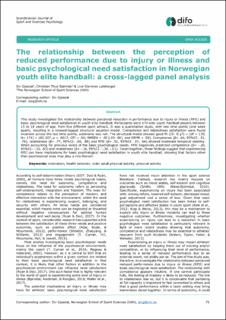The relationship between the perception of reduced performance due to injury or illness and basic psychological need satisfaction in Norwegian youth elite handball: A cross-lagged panel analysis
Peer reviewed, Journal article
Published version
Permanent lenke
https://hdl.handle.net/11250/3042593Utgivelsesdato
2022Metadata
Vis full innførselSamlinger
- Artikler / Articles [2119]
- Publikasjoner fra Cristin [1107]
Originalversjon
Scandinavian Journal of Sport and Exercise Psychology. 2021, 3, Side 76-82. 10.7146/sjsep.v3i.120880Sammendrag
This study investigated the relationship between perceived reduction in performance due to injury or illness (RPII) and basic psychological need satisfaction in youth elite handball. Participants were 174 elite youth handball players between 15 to 18 years of age, from five different sport schools. It was a quantitative study, with two time points (one week apart), resulting in a crossed-lagged structural equation model. Competence and relatedness satisfaction were found invariant across the two time points, autonomy was not. The structural model showed good fit ((S- B χ²) = [df = 130, N= 174] = 182.327, p < .0017; CFI = .96; RMSEA = .05 [.03-.06], and SRMR = .08). Competence (β= .64, 95%CI: .51, .76), relatedness (β= .77, 95%CI: .66, .88) and RPII (β= .51, 95%CI: .37, .66) showed moderate temporal stability. When accounting for previous levels of the basic psychological needs, RPII negatively predicted competence (β= -.20, 95%CI: -.35, .83) and relatedness (β= -.16, 95%CI: -.30, -.01). Taken together, these findings suggest that experiencing RPII can have implications for basic psychological need satisfaction in youth elite handball, showing that factors other than psychosocial ones may play a role therein.
Beskrivelse
This is an open access article distributed in accordance with the terms of the Creative Commons Attribution (CC BY 4.0) license, which permits others to distribute, remix, adapt and build upon this work, for commercial use, provided the original work is properly cited.
